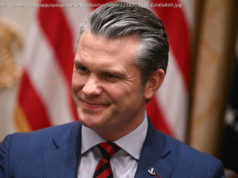Trump’s immigration crackdown is an exercise in government cruelty.
When the history of the Trump years is finally written, one of the president’s signature policies, one of his lasting achievements and legacies, will be the deliberate use of armed force to separate immigrant mothers and fathers from their children.
Audio from detention centers documents children wailing uncontrollably at the loss of their parents, as Customs and Border Protection agents joke with each other about the racket the “orchestra” is making. In some cases, officers told parents they were just taking the kids away for baths, whereupon it “dawned on the mothers the kids were not coming back.” One Honduran man, after being separated from his family, died by suicide. A staffer at a Texas facility housing separated children reported seeing kids attempt suicide too.
The last time the Trump administration did something this wantonly cruel, when Trump and his team instituted their first “travel ban” and barred refugee admissions in January 2017, I found myself turning to the writing of another migrant, who, fleeing violence just like the Central American families at the southern border, made her way to America some seven decades ago. Judith Shklar was born to a Jewish family in Riga, Latvia, in 1928. In 1939, with the twin threats of Nazi and Soviet invasion mounting, the family made its way to Sweden. After the Nazi occupation of Norway raised fears that Sweden could meet the same fate, they fled again to the Soviet Union, trekked from Moscow to Vladivostok, and eventually arrived in Seattle.
Upon arrival in America, they were „immediately arrested and detained as illegal aliens,“ Shklar’s biographer Andreas Hess writes. A rabbi happened to find them in a detainment camp, along with mostly Chinese immigrants, and was able to convince authorities that these „decent“ Jews did not belong with the likes of the Chinese. The family was released, ultimately settling in Montreal.
Shklar would return to America as an adult, as a professor at Harvard and one of the most influential political theorists of the late 20th century. Some political philosophers like to theorize about what goods governments should try to promote, the things that are best in life like freedom and happiness and dignity that should be maximized. Shklar devoted her life to considering the bads government should avoid and fight. She sought to identify a summum malum, an ultimate evil, „which all of us know and would avoid if only we could.“ And she identified that ultimate evil as cruelty.
That, I think, is what is uniquely repulsive about Trump’s crackdown on immigrant children. It’s not just that the policy is dumb, or wrongheaded, or unjustified. It’s cruel.
Cruelty, to Shklar, was “the deliberate infliction of physical, and secondarily emotional, pain upon a weaker person or group by stronger ones in order to achieve some end, tangible or intangible, of the latter.”
Cruelty, she was careful to note, is not the same as sadism. Public cruelty, the cruelty of governments and the men and women who run them, has an end; it is meant to achieve something, whether that be racial purity and national rebirth, or a classless industrialized society, or more modest goals — like satisfying nativist urges to preserve the racial and religious character of the nation, or at least not let it change too much. And this kind of goal-oriented cruelty is enabled by the unique and vast ability of governments to instill fear in those over whom they wield power.
It is easier to be cruel as a public official, because it is easier to see one’s victims as an abstraction. “When one begins with cruelty, an enormous gap between private and public life seems to open up,” Shklar wrote in her essay “Putting Cruelty First.” “It begins with the exposure of the feebleness and pettiness of the reasons offered for public enormities, and goes on to a sense that governments are unreal and remote from the actualities about which they appear to talk.”
The reasons for Trump’s family separation policy could not be more feeble, and could not be more petty. It serves no actual border security purpose; the Trump administration claims a pilot of the policy in El Paso reduced border crossings by 64 percent, when they actually increased by 64 percent after the policy was enacted. Lately, Trump officials have stopped even bothering to defend the policy in terms of deterrence, instead lying and claiming the law requires them to separate families (it does not).
Maybe Trump, and Homeland Security Secretary Kirstjen Nielsen, Chief of Staff John Kelly, and senior advisor Stephen Miller, all really believe this policy is needed as a deterrent to illegal border crossings. Or maybe they are motivated by simple bigotry against Latino/a immigrants.
But the seductive quality of public cruelty is that it needn’t matter. You don’t need to be motivated by sadism or bigotry or some other base, inhuman impulse. The sheer distance from your victims makes it possible to inflict horrors you never would have imagined yourself capable of committing face to face.
The potential of public cruelty is deeply disturbing, and creates real fear about what governments are capable of. But Shklar was no anarchist. She was a liberal, in the sense of thinking that individuals need protection both from the state and by the state. And the latter is possible because liberal democracies can enact safeguards that prevent, or at least minimize, the expression of cruelty by public officials.
The most crucial of these safeguards, she wrote, was the guarantee of equality, of equal treatment. In unequal societies, where one group or set of individuals is privileged in power above others, that power differential creates the social distance necessary for the powerful to treat the less powerful with cruelty.
„If such social distances create the climate for cruelty, then a greater equality might be a remedy,“ she wrote. „Even Machiavelli had known that one cannot rule one’s equals with cruelty, but only one’s inferior subjects.“ Her egalitarianism stemmed from „a fear of the consequences of inequality and especially of the dazzling effect of power. It is an obvious result of putting cruelty first.“
You don’t need to imagine absolute monarchs or the totalitarians of Nazi Germany and the Soviet Union to see what this means. As University of Michigan political scientist Robert Mickey has written, a whole region of the United States — the former Confederacy — was under authoritarian rule from the 1890s until the slow collapse of Jim Crow in the 1940s-’80s. And just as in any other authoritarian regime, the American authoritarian states fostered inequalities that enabled mass cruelty. Today we look back in naive horror and ask how lynchings could’ve been announced in advance in newspapers as though they were parades, how law enforcement could’ve looked the other way or even participated, how witnesses could keep body parts of murdered black men as souvenirs from the festivities. This is how. Social inequality, social distance, breeds cruelty.
And we should not shy away from the role of President Trump and this order in particular in fostering and promoting that kind of social inequality. When a presidential candidate announces his campaign by declaring Mexican immigrants to be rapists and murderers, and then proceeds as president to rip immigrants from their children, he has already made it very clear he does not view his victims are his moral equals, as deserving of protection and safety as himself, his family, his race.
The shocking nature of Trump’s actions, and their violation of American ideals of equality and equal treatment, can tempt one into comforting patriotic denunciations: that this is un-American, goes against our history, goes against everything our country stands for.
The truth is that this is very American, very in keeping with the worst that America has to offer.
Start
United States
USA — Events Donald Trump, the family separation crisis, and the triumph of cruelty






